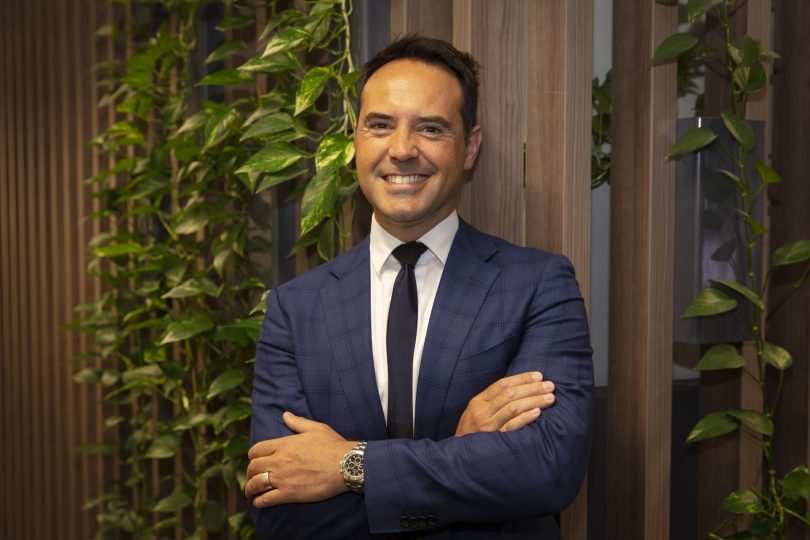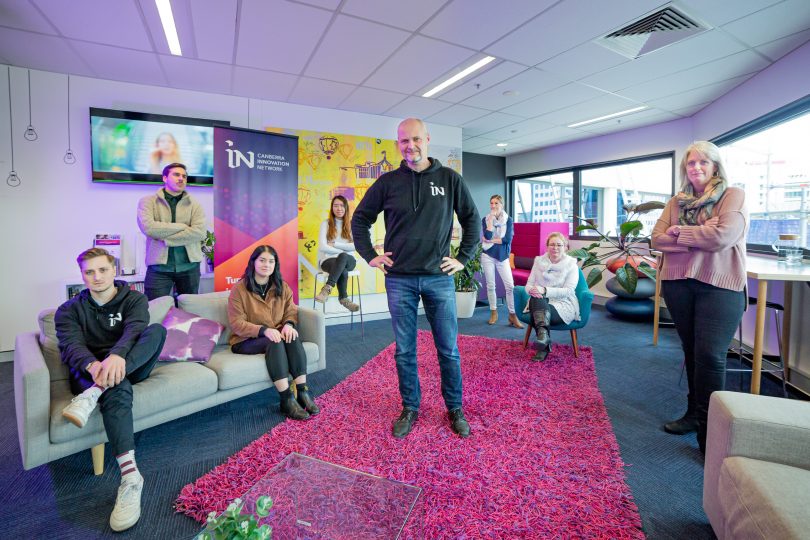
Massimo Di Maio joined the Meyer Vandenberg commercial law team as special counsel, franchise law, in 2020. Photo: Thomas Lucraft.
Being an entrepreneur and founding a successful startup is a dream for many people who slog away at uninspiring nine-to-five jobs, but a prominent Canberra commercial lawyer says seeking qualified advice before you get going on a new enterprise can save you from future pain.
Meyer Vandenberg commercial lawyer Massimo Di Maio says he’s seen firsthand what happens when keen entrepreneurs don’t invest time and money in getting their business established and structured correctly.
Massimo has dealt with startups throughout his career and says seeking legal and accounting advice in the early stages is crucial.
A spokesperson for the Canberra Innovation Network (CBRIN) also agrees there is a definite need for qualified legal advice during the early startup process. But they say this should not dissuade budding entrepreneurs from going ahead with their idea.
CBRIN offers a range of programs such as ‘Idea to Impact’, ‘Small and Medium Enterprises (SME)’ and ‘Office Hours’, which offers startups and entrepreneurs access to lawyers, accountants and human resources firms, all of which can be useful for newbies to the business world.
“If you have a great business or product idea you wish to develop, there is a definite stage where you should invest in good advice, but make sure you can get your idea off the ground before diving into the details,” says the CBRIN spokesperson.
A common issue for startups is a lack of organisation when it comes to having all the relevant governing documents in place for the chosen corporate structure.
For example, if you want to establish a startup as a proprietary limited company with multiple shareholders, Massimo recommends a shareholders’ agreement be put in place.

The team at Canberra Innovation Network says obtaining the right advice is important for budding startup operators, but they don’t want potential entrepreneurs to get discouraged too early on. Photo: Canberra Innovation Network.
“Depending on how sophisticated the structure will be, the shares in the company could be held by another company acting as a corporate trustee of, as an example, a family trust,” says Massimo.
Shareholders’ agreements are very useful documents as they ensure full transparency on several aspects of the company management and ownership.
While there is a cost to obtain the right documentation, Massimo knows from experience that spending the money at the start of the journey saves heartache down the track if a disagreement arises between shareholders.
“Disputes between shareholders who do not have a shareholders’ agreement in place can easily reach thousands of dollars in legal costs down the track,” he says.
A big fight in court is an expensive and potentially disastrous outcome, says Massimo.
Another important step is to ensure a company’s assets are protected.
“Whether you’re a startup in IT, retail or the services industry, one of the biggest assets is your intellectual property (IP),” explains Massimo.
A common arrangement that Massimo often suggests will see both a trading company and an IP company created.
“This allows one company to then provide a licence to the trading company to use the intellectual property,” he says. “Then the trading company enters into other contracts with clients and the IP is protected should anything happen to the trading company, in respect of liabilities and so forth.”
IP protection can even be important right down to details such as logos, branding and company names, says Massimo.
“Many startups will invest heavily in marketing, but if proper protocols aren’t followed to check the logos and words are not already trademarked, it might all be in vain,” he says.
Massimo also recommends ensuring your accountants and lawyers are all on the same page in terms of what structure you want to go down to prevent any discrepancies.
“The documents drafted by your lawyers should be consistent with the recommendations of your accountants,” he says.


















